- Home
- Harlan Ellison
No Doors No Windows Page 16
No Doors No Windows Read online
Page 16
He had called Bob immediately, reaching him at the brokerage. All the relatives had shown up an hour later, all terrified, all anxious to help, all anxious to kick in their share of the two hundred thousand dollars to get their darling little Penny back again.
Felice had had to be put under a sedative, and for a time Roger worried only about Bob’s suspicious nature. He knew the question would come up of why Penny had been singled out for kidnapping, but he pretended too much anguish to worry about trivial details, and the question passed unnoticed. So did all the others—how the kidnapper had gotten in, how he had left, what would happen if they did see the police—and finally, Bob and Ralph and Madge and Harold had called their lawyers for the money.
Two hours later the money arrived, and Roger was adamant about carrying the payoff. “After all, she is my little girl, even if she is my step-daughter!”
Three years in high school dramatics paid off handsomely. They believed him. He had the money.
The next day at noon, he took the envelopes of bills—which, under the pretense of being the distraught father, he had checked to insure against markings—and went to the subway, making certain he was not followed.
He left the money wedged behind the big candy machine bolted to the wall in the subway, and came home, describing a pock-faced man with hat pulled low who had disappeared into the subway immediately after telling him to go home and wait and to tell no one what had happened.
They believed him.
What else could they do.
He cried so damned convincingly.
The night was not moonless, but the overcast clouds blotted it so effectively, it might well have been. He drove to Red Bank with a light heart. He would wait an appropriate length of time before using the money be had retrieved from behind the candy machine. The money that nestled under the rubber matting of the car’s trunk. He would use small amounts to make token payments to all his creditors, to forestall them, and in a year he would have it all paid off, with enough capital to expand a bit.
Roger whistled merrily as he drove the endless night to the abandoned farm house.
Penny had worked steadily at the ropes. They were tight, but a nine-year-old girl’s fingers are small, and fingernails are sharp, and two days struggling, though producing bloody hands, could work wonders. It was night again. She could tell, because the owl in the tree somewhere outside to the left was hooting again in that frightening way.
Then, suddenly, the bonds were loose, and her numbed hands slipped free. She struggled with the tape over her eyes, ripping it off painfully. Then the tape from her mouth, and she spat out the gag with a strangled cough. It was so, so, so dark from behind the tape; she could see nothing. Then, as she fumbled with the ropes that bound her feet, the tool shed came into focus a bit.
She heard a car drive up outside, and stop. Then the crunch of footsteps approaching. Was he coming back? What would be do to her now?
Vague, formless terrors of childhood surrounded her: the devil, the bogey-man, the twitchee that Daddy said would eat her alive if she whined, all of them back to haunt her at once. Two days of terror mounted in her throat, and she turned like a caged animal, a small animal, seeking some way out. The door was the only way, and now she could hear the steps approaching the door.
She saw a flicker of lighter something in the dirt by the wall, and reached for it.
A pitchfork, broken off three-quarters of the way up the handle.
She hefted it, feeling the bits of dirt clinging to the wood. The rusty pitchfork felt terribly heavy in her tired arms, but she stood trembling, ready at least to scream and fight!
The footsteps began to hurry, almost run, as though the man was in a rush to do what he had come to do.
Then the door burst open, and a gigantic black shape was there, and Penny lunged heavily at it. The combined speed of the running man and the lunging child drove the rusty pitchfork deep, deep, deep into the black shadow, and the man screamed high and whining, the sound bubbling up in his throat.
Penny screamed, and shouted at the shadow, “You let me alone, let me alone! I want my Daddy, I want my Daddy!”
The shadow bubbled again, then fell.
The night was silent once more, save the hoot of the owl in the tree, and the soft moan of the little girl as she cried, over and over, “I want my Daddy…”
TWO INCHES IN TOMORROW’S COLUMN
Benny kicked the electric blanket off his naked feet, patted Bonnie on her naked stomach, and placed the telephone receiver to his naked ear. Three chuckles of ringing and abruptly, on the other end, a cricket was rubbing its hind legs together. It was Candy, Orson Heller’s right-hand boy.
“Mistuh Helluh’s office,” the cricket chirruped.
“Candy baby!” Benny was not smiling. “Like to talk to Mr. Heller. This is Benny.” Bonnie had lit a filter; now she handed it across, and Benny puffed deeply.
“Jus’a’minnit, Mr. Mogelson. Mr. Helluh’ll be right whichah.” There was the soggy sound of a hand coming across the mouthpiece, a faraway voice, and the phone changed owners.
Orson Heller—who, for seventeen years, had been in charge of the Combine’s hit system, i.e., its assassination branch—cleared his throat. As befitted the new owner of the Sunset Strip’s poshest dining club. “Benny. How’s my PR man?”
“Orson, I’m a hero.”
“That so?”
The public relations man straightened in Bonnie’s bed, and flicked ashes unceremoniously onto the white pile rug. “So. Very much so. Remember I told you I’d make you a star? Well, by this time tomorrow, The Barbary Coast and its new owner—the celebrated Mr. Orson Heller—will be the hottest properties in Hollywood.”
“You talk a lot, Benny.”
Heller had not quite lost the thug tones he had employed for seventeen years. Or perhaps the weight of sixty-four men’s souls—shot, stabbed, doused with acid, embedded in concrete, and fed to the fishes—rested heavily on the vocal cords as well as the spirit.
“What I’m trying to build you up for, Orson sweetie, is—”
“Don’t call me those names, Benny.”
“—uh, yessir, yessir, well, what I’m trying to tell you is that you get two inches in tomorrow’s paper. And are you sitting down? Are you planted firmly? Are you ready for this? Ta-ra-ta-taaaa! You, oh employer of mine, will be two inches in Bonnie Prentiss’ column.”
The smirk came unbidden to Benny Mogelson’s publicly related face.
The gasp was tiny, but audible, at the other end. “Bonnie Prentiss? Saaaaaay…” Heller drew the word out with awe and pleasure. “Benny boy, you are a winner. An authentic winner. How did you manage that?”
Benny’s hand strayed absently to Bonnie’s full breasts. Firm and still warm from the recent encounter. “Oh, just a little schmachling—a little butter—Orson. Miss Prentiss and I are old friends.”
Heller was delighted. “Great, Benny, just great. I knew when I hired you on as PR for the club, I just knew, you were going to pan out Glad to see it. See you tomorrow after the column hits the newsstands. A little bonus perhaps.”
“Fine, Orson. Just fine. Talk to you tomorrow.”
He racked the receiver and turned to Bonnie. She was really getting long in the tooth, he mentally noted for the thousandth time. The little crow’s tracks were becoming more prominent, even with her heavy tan, evenly laid on by metal reflectors, poolside. And the sooty puddles of dissipation under the eyes were daily becoming a little harder to disguise with heavier and heavier layers of pancake makeup. Too many over-sweet daiquiris, and too many overplayed young boys. Too many rocks in the rack with hustlers like Benny Mogelson, PR man supreme.
“That hood!” Bonnie Prentiss snorted viciously. “All the French cuffs, big studs and white-on-white ties will never make him anything more than a hood. Why do you associate with such filth, Benny?”
“Because,” Benny replied nastily, snubbing the butt in the onyx ashtray, “this is a town full of teeth, Bo
nnie baby, and I have this thing about fang marks in my neck. Heller pays me a nice fee for getting him promo coverage. If I don’t do it, some other schlep’ll do it instead.”
“He’s a dangerous clown,” Bonnie said, rubbing herself up against Benny.
As he turned toward her again, feeling her body heat rise, Benny murmured softly, “Hey, baby, that, uh, that column already went to bed, didn’t it? Tomorrow’s items?”
“Mmm-hmm,” Bonnie hummed, reaching her half-open mouth up to his. “Time for everybody to go to bed…”
Benny closed his eyes and moved in next to her. He had to close his eyes; he couldn’t stomach making love to Bonnie with them open…the aging harridan…and with his eyes closed be could dwell in silence and darkness on the exquisite pleasure of the letter she would receive in her mail that day. The letter that would tell her it was all over between them; that he had been using her lust and his cunning against her for three months; bedding her in exchange for favorable items about his clients in her column. The letter that wished her hail and farewell, since he now had a happy and contented list of big-name clients who would stick with him despite the anger he knew she would direct against him.
“…but it gets to be time for me to remember that Fm a human being, not a rutting machine,” the letter concluded, “and there are other columnists I don’t have to wallow in scum with, to get a mention. Bye bye baby. Stay well, and say hello to the next young patsy you sucker into your sack.
With eyes closed, and hands mechanically busy, Benny could dwell on the fact that he had outsmarted Hollywood, that the town had not gotten to him, that he had come out on top.
Yes, this time he was on top.
And after a while, she was.
Benny’s tailor was fitting the new hopsacking sport jacket in the office (very Palm Springs: double-breasted, royal blue, military crest buttons), when the phone call came. It was a full day since he had last seen Bonnie, and he had been expecting this call. She had gotten the letter.
“Mr. Mogelson,” said the switchboard girl, “Miss Prentiss on 45, sir.” He pressed the button and Bonnie’s voice came floating out at him.
“Benny darling, I got your letter.”
He took a deep breath. What threats would she offer? “Sorry, Bonnie. But it’s been a hard three months.” He tapped his right cuff, holding the phone with his shoulder, indicating to the kneeling tailor that he wanted more length at the wrist.
“I understand perfectly, darling. Perfectly.” Bonnie almost purred. Benny’s eyes narrowed. She didn’t sound angry.
“It was fun while it lasted, Bonnie, that’s it.” He tried to goad her into frenzy, trying to extract from her a tiny measure of anguish for the degradation she had heaped on him for the blackmailing hours in her bed of pain.
But Bonnie was soft as one of Dali’s watches. “Benny, my sweet, I understand completely. I’m sorry I misused you. Well, I’ll just sign off now, darling.”
There was a golden pause.
“Oh, yes,” Bonnie added, almost as an afterthought, “you know my friend Theo, at the Amusement Center? He also sends his hellos and goodbyes. Night-night, darling.” And she was gone.
He was still holding the phone as the switchboard girl came back on. “Mr. Mogelson? Today’s papers are here, sir. Do you want me to send them in with Diane?”
Benny answered yes, absently, and hung up the phone, still perplexed by Bonnie’s call. No fury? No threats? There was something wrong. That woman had ruined better men than him for less than what he had done to her. She was infamous in Hollywood; the most vindictive shrike going. And that comment about Theo, at the penny arcade. Now what the hell did she mean by that…?
The office door opened and Diane came in, depositing a stack of daily papers on Benny’s desk. “I’m leaving now, Mr. Mogelson,” she said. “My afternoon with the dentist.” She smiled at him with her almost complete set of capped teeth. Benny nodded absently; he was still thinking about Bonnie.
“Oh, there’s a paper there from Miss Prentiss’ office, Mr. Mogelson,” she added, hand on doorknob. “It came over by special messenger a few minutes ago.”
Benny had hurriedly rummaged through the paper seeking Bonnie’s column before the office door had closed behind the secretary. He found it and scanned down the column till he found the item:
For T-Men curious about phony restaurateur Orson Heller’s income tax, a reliable tipster informs this columnist that a careful study of safety deposit boxes in the Farmers’ Trust, the Surety National and the Seaforth Savings & Loan under the respective names Seymour Sunson, Walter Moon and Kenneth Stand will reveal interesting results. Mr. Heller’s current enterprise, the shabbily renovated Barbary Coast boîte, fails to purchase for this gentleman the respectability denied him by a career as checkered as his tablecloths.
Benny’s mouth was dry as chalk-dust. It was impossible. He had read the item before she had sent it to the newspaper. She couldn’t possibly have changed it. The edition had gone to bed a day ahead of time, standard procedure for syndicated columnists, and there was no way of calling it back. He grabbed up a newsstand copy of the paper from the desk, and turned to the column. He’d been right. It was as she had sent it in.
Then what was this other, deadly, item?
He had no more time to wonder about it; the door to the office opened, and Orson Heller and Candy came into the room softly. “Leave!” Candy jabbed a finger at the tailor.
The tailor took one look at Candy, at the set of his yellow teeth against his lower lip, and nearly swallowed the pins in his mouth. He looked up at Benny Mogelson. “I said: leave,” Candy repeated. The tailor left, hurriedly.
Benny found himself staring at the blued-steel bulk of a .38 Police Special, the cumbersome cylinder of a silencer marring its smooth muzzle length. “Orson, baby, I—”
“I got this by special messenger, fifteen minutes ago, Benny buddy,” Orson said gently, handing across the folded edition of Bonnie’s newspaper.
One glance told Benny it was the bogus edition, and all at once, clearly and quickly, he knew what Bonnie had done. Theo, at the penny arcade, printed up dummy newspapers. The kind hick tourists bought, with jazzy headlines like HARRY SMITH HITS HOLLYWOOD, GIRLS TAKE TO THE HILLS!
And before Heller could get to Bonnie, she would somehow let him know it had been a gag, and get the real, the street, edition to him, saying Benny had thought it would be a funny bit, for his eyes only…or some-such drivel. But it would work; Heller would think ten times before giving Bonnie—as big as she was on the scene—a hard time.
But that wouldn’t save Benny.
It would be too late, then.
“Orson, baby, sweetie, listen, I—”
“I’ve told you, Benny, don’t call me those names,” Heller said companionably.
The silencer chugged once, asthmatically.
Benny was spun backward, against the desk, and as he hit the floor, as the light began to flicker and dim, he realized they would never find his body. He would be gone, like most of the other men Heller had hit. Bonnie had fouled him good. Very good.
Today, Orson Heller had gotten his two inches in the daily edition.
And by tomorrow, Benny Mogelson would have gotten six feet, or possibly full fathom five.
And as the light went further and further away, finally fading out entirely, he contemplated the ultimate irony of his career; that Benny Mogelson would never, never even get his two inches in tomorrow’s column. The obituary column.
PROMISES OF LAUGHTER
All you need to know about me is that I was maybe, just possibly, there’s a good chance, you’d better believe it, going down for the third time in the sea of life.
That was the way it was for me—maybe—the night I met Holdie Karp. First time I set eyes on her, coming across the room at that phonyass literary coke-spoon party, I knew we’d get down together. Didn’t need any vibrations, didn’t need any sparring, didn’t need any games people play; there was enoug
h heat coming off her to shatter my thermostat.
Denny Zucker introduced us. Denny was the lively arts editor of The Flash, an underground newspaper. Both Holdie Karp and I had written for him, and he knew we hadn’t met. “Johnny, this is Holdie Karp. Holdie, I want you to meet Johnny Noone.”
What a thrump of joy: not only did she have a considerable talent, but she was fine to behold, too. She was a writer, with a lot of clout, At one and the same instant we lunged at each other, me saying, “Hey, I read that piece you did on swinging singles in the Valley,” and her saying, “Hey, I read that piece you did on William DeVane,” and both of us coming in on harmony, “Jeezus, you can write!”
Then we stood there grinning at each other.
A week later, prior commitments being what they are, we wound up in bed.
She was a big lady and inventive and we both enjoyed the hell out of it. I was performing like the headline attraction in a Cuban Superman act. Ordinarily, I’m okay in bed…nothing to rent a Sunset Strip billboard to crow about, but Holdie brought out the best in me, a lot of which I hadn’t even known was in there. It went on for hours and hours, till the bed was soaked with sweat, and we ran out of baby oil to slop all over us. Oh, it was fine, just fine.
Couple of nights later I took her to a play. It was a bad play, and we dug it like mad because we both sat there knowing the other was hating it in precisely the same way, and when it was intermission we went out for a smoke. I lit her cigarette, and she lit mine; and we looked at each other and then looked at the poster of the play in the show-window of the theater; at the star and the director posing for the camera, looking like a pair of bats without a guano pile; and we broke up laughing. We split at once, went back to my place, broke apart long enough to use the two typewriters in my apartment to write our reviews of the play for our respective editors, and then fell into bed. We rolled around and around and laughed and did it everywhichway we could think of, just to thumb our noses at bats and their bum plays.

 Repent, Harlequin! Said the Ticktockman
Repent, Harlequin! Said the Ticktockman Broken Glass
Broken Glass Other Glass Teat
Other Glass Teat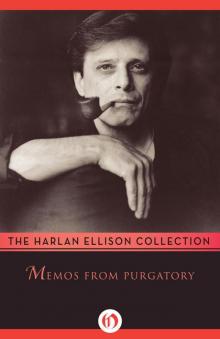 Memos From Purgatory
Memos From Purgatory I Have No Mouth and I Must Scream
I Have No Mouth and I Must Scream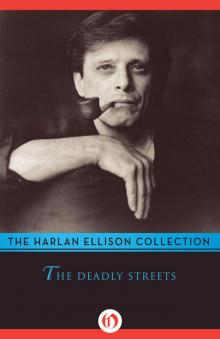 The Deadly Streets
The Deadly Streets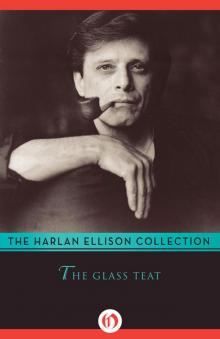 The Glass Teat
The Glass Teat Paingod and Other Delusions
Paingod and Other Delusions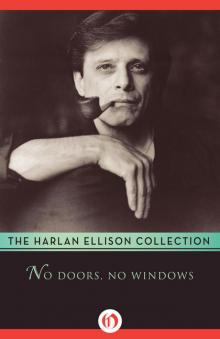 No Doors No Windows
No Doors No Windows Strange Wine
Strange Wine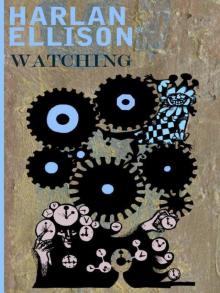 Harlan Ellison's Watching
Harlan Ellison's Watching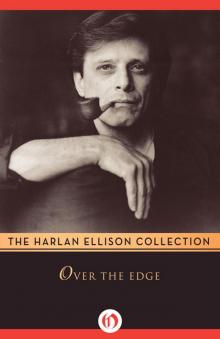 Over the Edge/An Edge in My Voice
Over the Edge/An Edge in My Voice Troublemakers: Stories by Harlan Ellison
Troublemakers: Stories by Harlan Ellison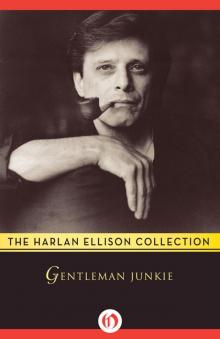 Gentleman Junkie and Other Stories of the Hung-Up Generation
Gentleman Junkie and Other Stories of the Hung-Up Generation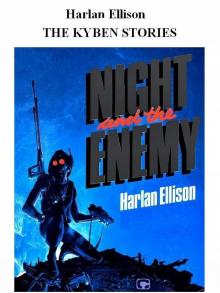 The Kyben Stories
The Kyben Stories From the Land of Fear
From the Land of Fear The Top of the Volcano: The Award-Winning Stories of Harlan Ellison
The Top of the Volcano: The Award-Winning Stories of Harlan Ellison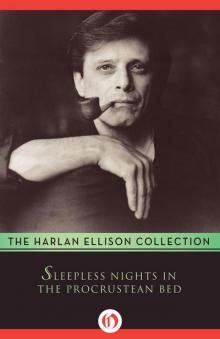 Sleepless Nights in the Procrustean Bed
Sleepless Nights in the Procrustean Bed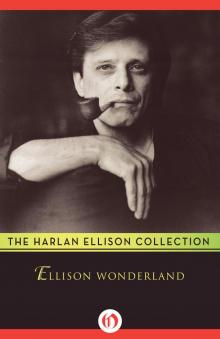 Ellison Wonderland
Ellison Wonderland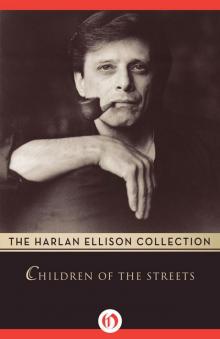 Children of the Streets
Children of the Streets Can & Can'tankerous
Can & Can'tankerous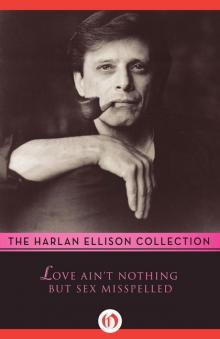 Love Ain't Nothing but Sex Misspelled
Love Ain't Nothing but Sex Misspelled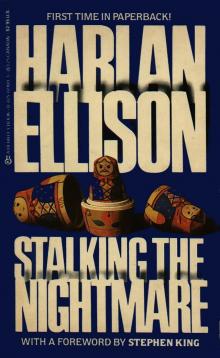 Stalking the Nightmare
Stalking the Nightmare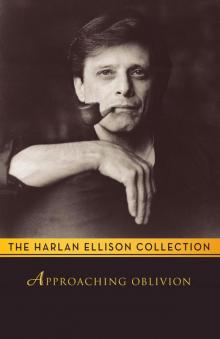 Approaching Oblivion
Approaching Oblivion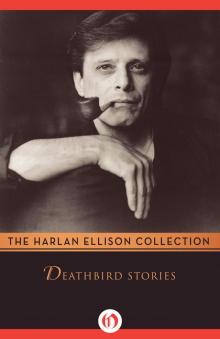 Deathbird Stories
Deathbird Stories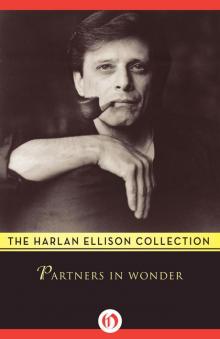 Partners in Wonder
Partners in Wonder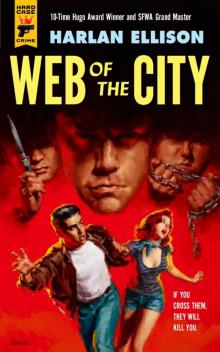 Web of the City
Web of the City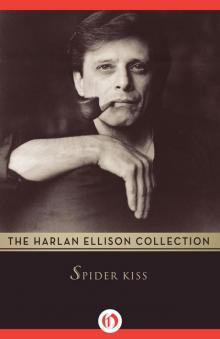 Spider Kiss
Spider Kiss A Boy and His Dog
A Boy and His Dog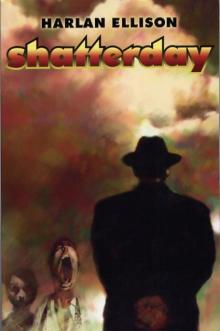 Shatterday
Shatterday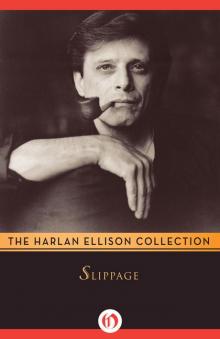 Slippage: Previously Uncollected, Precariously Poised Stories
Slippage: Previously Uncollected, Precariously Poised Stories Repent, Harlequin! Said the Ticktockman
Repent, Harlequin! Said the Ticktockman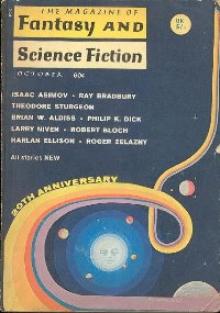 Come to Me Not in Winter's White
Come to Me Not in Winter's White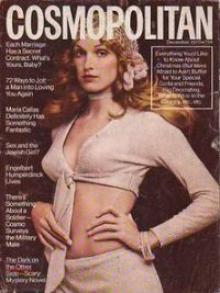 The Song the Zombie Sang
The Song the Zombie Sang The Other Glass Teat
The Other Glass Teat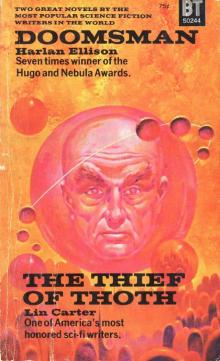 Doomsman - the Theif of Thoth
Doomsman - the Theif of Thoth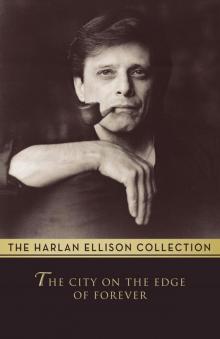 The City on the Edge of Forever
The City on the Edge of Forever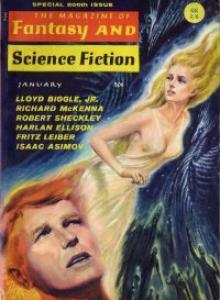 I See a Man Sitting on a Chair, and the Chair Is Biting His Leg
I See a Man Sitting on a Chair, and the Chair Is Biting His Leg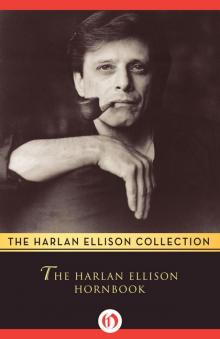 The Harlan Ellison Hornbook
The Harlan Ellison Hornbook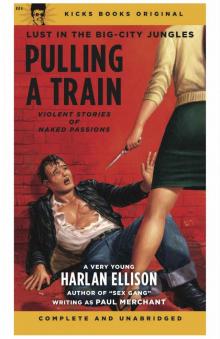 Pulling A Train
Pulling A Train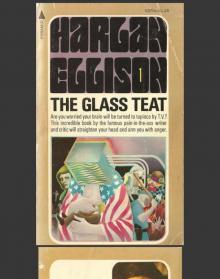 The Glass Teat - essays of opinion on the subject of television
The Glass Teat - essays of opinion on the subject of television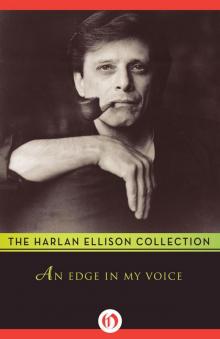 An Edge in My Voice
An Edge in My Voice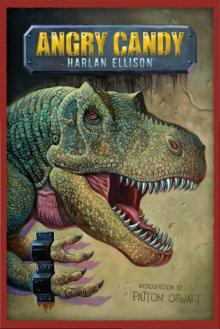 Angry Candy
Angry Candy Troublemakers
Troublemakers The Top of the Volcano
The Top of the Volcano Over the Edge
Over the Edge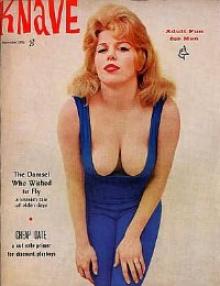 Survivor #1
Survivor #1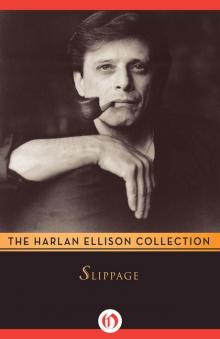 Slippage
Slippage